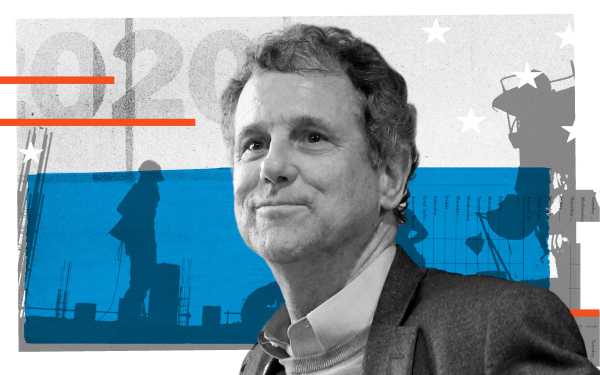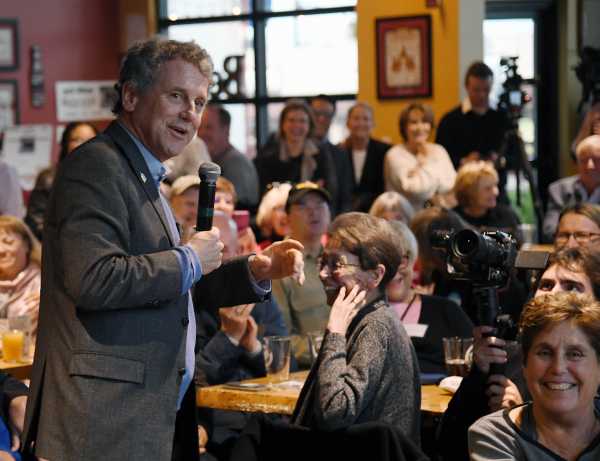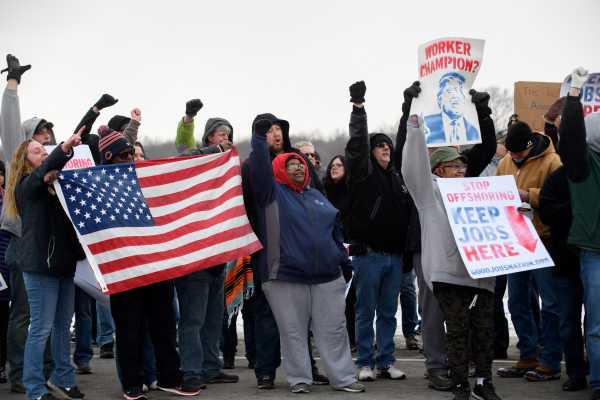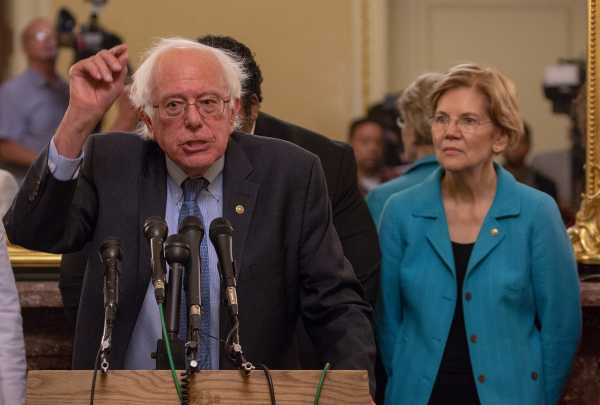
The “dignity of work,” Sherrod Brown’s plan for Democrats to win back working-class voters, explained
The senator from Ohio won’t run for president in 2020. But his economic platform is still inspiring Democrats.
By
Dylan Scott@dylanlscott
Updated
Mar 7, 2019, 12:30pm EST
Share
Tweet
Share
Share
The “dignity of work,” Sherrod Brown’s plan for Democrats to win back working-class voters, explained
tweet
share
Sherrod Brown is preaching a message he believes can win working-class voters for Democrats in 2020: the dignity of work.
“Work hasn’t been rewarded in this country the way we like to think it was historically,” Brown told me in a recent interview. “No job is menial if you make an adequate wage. You really start with that. One job should be enough.”
Brown is trying to bring back an old-fashioned, worker-centered populism to the Democratic Party. But he has decided that he won’t do that by running for president himself. The senator announced on Thursday that he would fight for the “dignity of work” from the United States Senate instead of pursuing the White House in the 2020 campaign.
“I will keep calling out Donald Trump and his phony populism. I will keep fighting for all workers across the country. And I will do everything I can to elect a Democratic President and a Democratic Senate in 2020,” Brown said in a statement. “The best place for me to make that fight is in the United States Senate.”
His lane in the presidential race would have been narrow one: He didn’t have the established base of Bernie Sanders, the popular charisma of Kamala Harris, the profile of Elizabeth Warren, or the Obama mantle of Joe Biden. His message will still have a place in the Democratic primary, however, as some of those candidates pick up the “dignity of work” rhetoric.
“The more they mention it, the better it is. I’m glad they’re mentioning it,” Brown told me before he had made his decision. “We knew that if I didn’t run, it’d still have an impact on the debate.”
Brown says this ethos is drawn from the words of Martin Luther King Jr., who once said that “all labor has dignity.” It is a belief that anybody who works a full-time job should be able to live a middle-class life — and a recognition that there are many kinds of “work” that we don’t treat as such.
Brown has drawn from a half-century of economic data and liberal theory to formulate a comprehensive and accessible narrative about how the American economy has changed. Productivity and wages had once increased in parallel, but that connection broke starting in the 1970s. American workers kept increasing their productivity, but real wages have fallen.
In short, work isn’t worth as much as it used to be. Brown lays the blame at the feet of corporations and their embrace of the gospel that their duty is to maximize their stock value. He says they’ve marginalized workers by eroding their collective bargaining power and through other forms of exploitation. He sees the worker-employer relationship as a fundamentally adversarial one.
“Something changed with Milton Friedman’s preaching … Friedman preached that companies had one loyalty and that is to stockholders,” Brown tells me. “It probably gave employers some economic and moral justification for doing what they might have wanted to do.”
His prescription is a thorough yet knowingly practical one: a tax overhaul, a minimum wage hike, and a strengthening of worker rights.

America’s economic problem, according to Sherrod Brown
Brown grew up in the central Ohio manufacturing hub of Mansfield and entered public service right out of college, becoming the youngest person elected to the Ohio Legislature in 1974. He has been in Washington since 1993, first serving in the House and then getting elected to the Senate in 2006. He won his third term in 2018 by a comfortable 6 points in a state Donald Trump had carried by 8 points just two years before.
The Ohio senator has been preoccupied with workers’ rights and corporate exploitation for years. But he has unified his beliefs into the “dignity of work” conceit more recently. He cites a compilation of King’s speeches on economic justice, edited by historian Michael Honey, as influential.
Brown emphasizes, over and over, how women and people of color never even enjoyed the same value for their labor as white men. He says he’s read King more later in his life, struck by “how much he talked about work and how much he talked to labor unions. How he was trying to meld the union movement and civil rights movement.”
“He did it with more success than I think history acknowledges,” Brown says, “but he fell short of what he wanted.”
Brown released a 77-page paper in 2017 outlining his indictment of the modern American economy. The heart of it is the decoupling of productivity and wages. The former kept rising, but the latter stayed flat. There isn’t a simple explanation; technological advances are partly to blame. But Brown also points to the decline in union power (the percentage of US workers in a union fell by half from 1983 to 2016) and a fundamental reorientation of corporate priorities. He blames Milton Friedman.
“Without romanticizing the past too much, companies used to operate in terms of stakeholders: customers, employees and community and shareholders. Now it’s evolved in all that matters is the bottom line,” Brown says. “Many companies operate under the premise that they have to operate only in the stockholder’s best interest. They always use the word fiduciary duty or responsibility. I just don’t think that’s true.”
If their stock price is all that matters, Brown reasons, companies have every incentive to exploit their workforce to produce as much as it can at the lowest possible cost, to maximize their short-term productivity. They have all kinds of tricks to achieve that: independent contracting, subcontracting, temporary workers, irregular schedules. Subcontracting is an instructive example. If a company hires another company to provide certain services, it is no longer deciding how much to pay those individual workers to perform those tasks. It is instead looking at bids, hunting for the lowest price.

We’ve seen the corresponding collapse of wage security and benefits. The number of workers involuntarily working part time hit a historic high of 9 million during the Great Recession, and while it has receded in an improving economy, the number remains well above pre-recession trend lines. More workers are working two part-time jobs. Retirement benefits give higher-income workers an advantage. Most workers still do not have access to paid family leave. Paid vacation time for lower-income employees is rare.
Brown says the fundamental problem is that the American political system — through the tax code, through monetary policy, through the turn from collective bargaining — has empowered corporations over workers. Work simply isn’t as valuable as it used to be. That’s what Sherrod Brown wants to fix.
Brown’s agenda: tax benefits, wage hikes, and more worker protections
Brown identifies an enormous problem, but how would he fix it? His “dignity of work” platform takes a multi-pronged agenda to attack these structural problems: an aggressive tax package that targets corporate behavior while extending new benefits to lower-income and middle-class families, a package of family-focused policies featuring paid family leave, an increase of the federal minimum wage to $15, and, finally, provisions to make it easier for workers to unionize while simultaneously cracking down on union-busting tactics.
When I asked Brown what he would prioritize, he started with a tax bill and ticked off four components:
Brown’s earned income tax credit expansion alone would lift an estimated 6.6 million Americans out of poverty, according to Columbia University projections, as Vox’s Dylan Matthews previously reported. The latest version of his child tax credit would take up to 4 million kids out of poverty, per the Columbia researchers.
Next, Brown turned to family policies. He hasn’t outlined a universal child care plan akin to Elizabeth Warren’s, but he has proposed creating a national Family Medical Leave trust that employers would pay into and would pay up to 12 weeks of benefits, especially helpful for those people who are not in traditional work arrangements.
“Child care should be seen as a public good. If you can nurture and launch a child at a very young age with good child care, their parents can do what they have to do,” he says. “That’s obviously a good thing for the public that this child has that kind of environment and care.”
Brown has a longer laundry list of more technical changes to protect workers. A few specific highlights:
- Fixing federal overtime rules
- Giving the IRS more latitude to crack down on companies that misclassify workers as independent contractors and allowing the government to claw back payroll taxes for those people so they can accrue Social Security benefits
- Bolstering collective bargaining rights by allowing even Americans in nontraditional work arrangements to unionize and penalizing companies if they attempt to discriminate against unionizing workers.
Brown’s plans also veer into territory over which only presidents have purview: He wants a Federal Reserve chair who would actually prioritize full employment as much as keeping inflation in check. The trade representatives he’d want to see appointed would also likely signal a dramatic reorientation from the free trade-friendly Democratic Party of Bill Clinton and Barack Obama.
How the “dignity of work” fits into the 2020 campaign
Brown would have brought credibility on a series of salient themes for the party right now — trade, unions, and workers’ rights— to the Democratic primary debate. One of his first votes in Congress was in opposition to NAFTA, in defiance of President Clinton. Progressive wonks I spoke with consider him one of the most effective lawmakers working on economic justice over the past few decades.
“He hasn’t been shaping himself into pretzels and reimagining himself,” says Thea Lee, the president of the left-leaning Economic Policy Institute, who is close to Brown. “He has a backbone.”
But as a working-class populist, he would have faced stiff competition from the other populists who already joined the race: Sens. Bernie Sanders (I-VT) and Elizabeth Warren (D-MA). Vice President Joe Biden, more centrist in his policies but with an established working-class appeal, is also inching toward a race and could have overshadowed Brown with those voters.

Brown is still a voice for populism in moderation. He doesn’t support Medicare-for-all (Warren has signed on to Sanders’s single-payer bill, though she also has a bill to shore up the Affordable Care Act). Instead, he endorses a bill that would let Americans over 50 buy into Medicare and floats the idea of letting police officers and firefighters join the program too.
Brown also told me he’s not ready to support a federal jobs guarantee, linking it to his feelings about Medicare-for-all and the Green New Deal, the other issue animating the left right now.
“A jobs guarantee is a little like Medicare-for-all and the Green New Deal. Great sound — how do you do it? I would assume you’ll hear more and more presidential candidates say it. One bird flies off the telephone wire, several do,” he told me. “We’re gonna keep our heads down and keep working on minimum wage and the overtime rule and equal pay for equal work.”
People who admire Brown point to a wonky disagreement between him and Sanders. Both senators have introduced bills framed around the same idea: taxing corporations if their workers depend on public benefits. They fit the worldview both men share that millionaire CEOs have for too long paid their workers too little and left taxpayers to pick the tab.
But while Sanders’s Stop Bezos Act links the levy directly to specific federal programs, which some left-leaning wonks fear would stigmatize workers who receive federal aid, Brown’s corporate freeloader fee instead uses the number of workers with incomes below a certain threshold.
“You don’t stigmatize because you aim at the company, not the worker,” Brown says.
None of the experts I spoke with were enthralled by either idea, to be clear, preferring to focus on providing more benefits to workers. But it’s that kind of attention to detail that Brown’s boosters believe the Democratic primary needs — though Brown’s decision to skip the race means there will be one less pragmatic progressive candidate.
Warren is the other progressive candidate who’s laid out an agenda as ambitious as Brown is proposing. She has released detailed plans for universal child care, giving workers seats on corporate boards, and taxing extreme wealth. The progressive policy leaders I spoke with — some of whom declined to be named while discussing the presidential campaign —emphasized a substantial amount of overlap between Brown and Warren, with some subtler distinctions.
The Massachusetts senator is seen as more of a firebrand, especially in her rhetoric. She also tends to focus more on the power imbalance between corporations and workers — her Accountable Capitalism Act, guaranteeing workers a say in a company’s decision-making, being a good example — while Brown takes more of an all-of-the-above approach. I actually asked Brown whether he wants to improve corporate behavior or make workers less reliant on their employer; he replied it was both.
“It’s making companies do the right thing,” he told me. “It’s giving employees a share of the wealth they create.”
Brown has tried to give Democrats the language to talk to the working-class voters who voted for both Barack Obama and Donald Trump. Even if he won’t pursue the White House himself, the Ohio senator should leave a mark on the 2020 debate.
Sourse: vox.com






